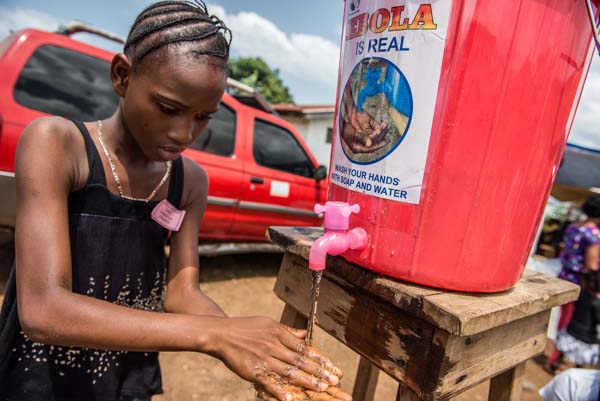

Media CenterEbola Update: Overcoming 5 Key Challenges with Effective Solutions

One year after the first case of Ebola was reported in West Africa, Catholic Relief Services (CRS) and our local partners continue to respond in Liberia, Guinea and Sierra Leone. As of March 18th, there have been over 24,500 cases of Ebola, with more than 10,000 reported deaths, almost all of them in Guinea, Liberia and Sierra Leone. Liberia has discharged its last Ebola patient and is now without a single confirmed case of Ebola, while Sierra Leone and Guinea have reported an increase in cases for the week leading up to March 15th. “Vigilance is imperative so countries can get to zero cases, and guard against a further resurgence of the outbreak,” says Dorothy Madison-Seck, CRS’ Regional Director for West Africa. “Because of the porous nature of the borders, getting to zero also means being your brother’s keeper. It has to be a victory in all three countries.” She adds, “While fighting the disease remains the priority for CRS, our long-term plan is helping the affected families, communities, and countries recover and rebuild from the many devastating effects of Ebola.” CRS is committed to supporting the most vulnerable people in affected communities, including women, children, families and healthcare workers, as well as government and civil society institutions that play a crucial role in stemming this outbreak and preventing future ones. Looking Ahead to Challenges and CRS' Continued Response At the start of the Ebola outbreak, CRS committed more than $1.5 million of private funds, and currently manages programs worth more than $15.6 million, focusing on the following challenges:
Challenge 1: Routine health care
Reduced numbers of health care workers and decreased health facility visits, which has meant that women and children are missing essential life-saving care and services.
CRS Response:
CRS is supporting government and faith-based health facilities in areas such as Ebola infection control, leadership and governance, service delivery, finance, infrastructure, and supply chain management.
Challenge 2: Livelihoods
For households with family members who have died from Ebola, there can be a significant impact on household income. This, combined with an influx of Ebola orphans, has meant that many continue to struggle to meet basic food needs.
CRS Response:
CRS will be continuing market-based recovery activities to support farmer families. These activities include direct cash distributions and food-based vouchers to reach the most food insecure households in Ebola-affected regions.
Challenge 3: Orphans and vulnerable children
Ebola unraveled the social fabric of life in affected West African communities. Almost 17,000 children have been orphaned, and Ebola survivors often face stigma and discrimination.
CRS Response:
CRS is strengthening social services & psychosocial support for orphans by implementing child protection activities that can help prevent early marriage and pregnancy, child trafficking, and exploitation.
Challenge 4: Education
School closure deprived at least 5 million children of months of school education. Schools are only recently beginning to open.
CRS Response:
CRS and its partners will focus on support to the Catholic school system to ensure access to schools is restored and to effectively implement national guidelines on handwashing, temperature taking, and other key Ebola prevention measures.
Challenge 5: Safe and dignified burials
Traditional burial practices have been a huge challenge to containing the Ebola outbreak. While washing deceased bodies is an important part of West African cultures, it exposes family members to infectious bodily fluids.
CRS Response:
In Sierra Leone, CRS is helping manage thousands of safe and dignified burials in three districts to prevent further infections and respect families' religious practices. CRS is now expanding the program to Kenema, Sierra Leone's third-largest city.
CRS’ work is building on more than 12 months of activities, including the following: Providing critical health supplies and infrastructure
-
Six Catholic health facilities in Liberia were assisted in establishing triage and isolation areas, supplied with personal protective equipment, and supported in improving hand-washing stations
-
8,500 household hygiene kits were distributed to vulnerable households
Strengthening health systems
-
3,450 health care workers from over 200 health facilities trained in infection prevention and control
-
4,300 safe and dignified burials through the burial team, which manages a fleet of 121 vehicles and 199 motorcycles
Educating the public about Ebola
-
5 million people reached with life-saving messages through radio and SMS
-
2,600 community volunteers trained to conduct interpersonal communication with over 375,000 people
-
1,600 community and religious leaders trained to raise awareness
Ensuring food security
-
143,000 people in vulnerable households received food assistance
Providing psycho-social support
-
5,000 Ebola-affected people and their communities reached using local radio programs to reduce stigma and link to existing psychosocial support services
Related articles:

